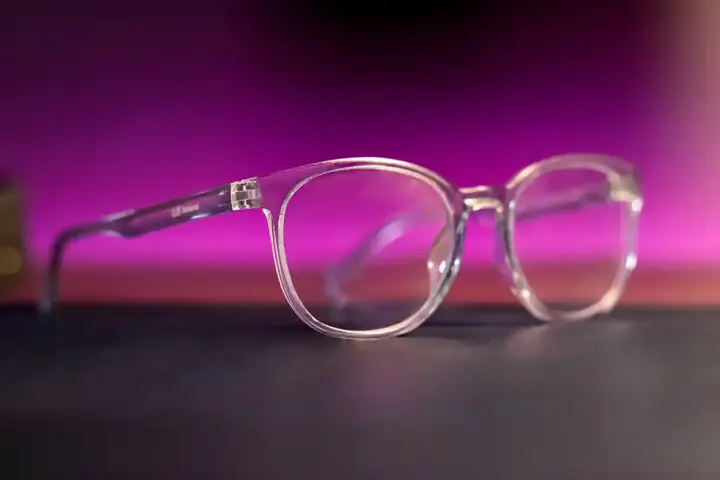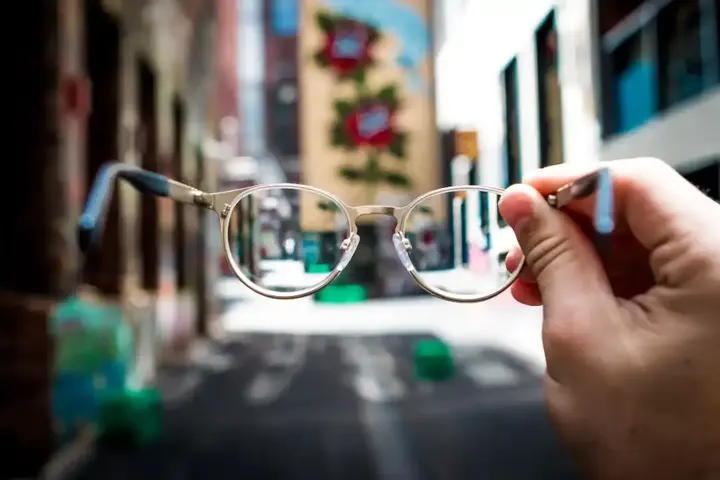Smart glasses help the sighted! A terrible scientific achievement!
Research and applications have shown a great scientific achievement in the field of helping the blind and visually impaired, as smart glasses show great potential to help people of determination live a better life. However, there are some challenges that must be overcome before smart glasses become widely available.
Show key points
- Smart glasses equipped with AI and 5G technology are a groundbreaking innovation to assist blind and visually impaired people in leading more independent lives.
- These glasses offer various functionalities such as text reading, object and face recognition, navigation assistance, and real-time language translation.
- A real-life user reported significant improvements in daily tasks and enhanced independence following the use of smart glasses.
- ADVERTISEMENT
- The technology promotes social inclusion and can potentially increase access to education, employment, and digital services through app interaction and internet browsing.
- Despite their promise, smart glasses face challenges such as high costs, privacy concerns, and the need for user adaptation.
- The development of smart glasses is still ongoing, and continuous research is needed to refine their features and ensure wider accessibility.
- In the long term, smart glasses could have a positive economic impact by creating jobs and reducing the financial burden of support for the visually impaired.
Smart glasses use 5G technology to connect to the internet, allowing them to send data to the cloud where it can be processed by ChatGPT. ChatGPT can then understand the world around the person and give them useful information. Allowing it a range of features that improve the lives of its users.
Smart Glasses for the Blind: Steps towards a More Accessible and Open World

The glasses were tried by a smart glasses user, a blind person, and these glasses helped to change his life positively. He is able to navigate independently, communicate with others, and do many daily tasks that were difficult or impossible for him before. Smart glasses can greatly improve the lives of people with special needs. It provides them with independence and freedom that was previously impossible.
Recommend
From this experience, it was found that smart glasses can indeed help users in:
Read text: Smart glasses can scan text and translate them into voice. Such as banners and documents, understand them, and then read them aloud to the user. This also enables them to read books, newspapers and other publications, as it opens up a wide range of knowledge and information.
Object recognition: Smart glasses can identify objects in the world around a person and give them information about them. Such as people and brands of stores.
Face recognition: Some glasses help identify the people around the user through facial recognition technology, which enhances their social interaction and reduces their dependence on outside help.
Get directions to walk and navigate: Smart glasses can help users navigate by giving them vocal directions. This allows navigating familiar and unfamiliar places, as well as issuing alerts about obstacles and steps.
Communicate with others in different languages: Smart glasses can help users communicate with others through simultaneous translation. Written or spoken texts can be translated in just a few moments directly, allowing users to communicate with people who speak different languages.
Interactively access to information:
Internet browsing: Some glasses enable browsing the Internet through voice commands, allowing blind people to access various information and services online.
Interact with apps: Some glasses allow interaction with different applications such as social media apps and transportation apps, enriching their lives and facilitating their daily tasks.
Potential Benefits of Smart Glasses

AI-powered smart glasses are a promising technology that can make a big difference in life. Many who watched the experiments showed enthusiasm to see how this technology will develop in the future. Smart glasses with AI technology offer the blind a revolutionary experience that changes their perception of the world and gives them a new level
Improved independence: Smart glasses can help you live a more independent life without relying on traditional means or relying on the human assistant.
Quality improvement: Introducing new experiences by being able to do tasks that were not possible before.
Increased opportunities: Smart glasses can help blind and visually impaired people increase their chances of working, education, and participating in society.
Potential challenges of smart glasses

Cost: Smart glasses can be expensive, which can make them unavailable to some people.
Privacy: It may raise some privacy concerns, as it can be used to collect data about users.
Cognition: Some people may need time to adapt to use.
The experiment is still in its early stages and requires further development to reach its full potential.
Research and development of smart glasses for the blind continues at a rapid pace, with new features and possibilities periodically emerging. It is important to note that each person's experience with smart glasses is unique, and depends on their individual needs and circumstances. It allows them to participate fully in society. It can also have an economic impact, as it can create new jobs and help reduce the cost of caring for the blind and visually impaired.
![]()
How can I stop wasting time?
Distractions like phones and social media eat up your time. Create routines, set priorities, and work in focused time blocks. Keep your phone silent, avoid multitasking, and believe in yourself to overcome procrastination. Small changes can make your days much more productive. more- ADVERTISEMENT
![]()
How periods of consistency guided me to the goal: your actions are your compass
How Periods of Consistency Guided Me To Purpose- Your actions are your compass more- ADVERTISEMENT
![]()
Rare but deadly natural phenomena: a fascinating look at the extraordinary forces of the Earth
Nature stuns with rare spectacles like ghost apples clinging to branches, red rain falling mysteriously in India, and jellyfish lightning flashing above storms. From Venezuela’s eternal lightning storms to Australia’s rolling morning glory clouds, these phenomena showcase Earth’s strange, powerful beauty—and remind us how little we really know. more- ADVERTISEMENT
![]()
Solar panels in the Sahara desert could boost renewable energy but harm global climate
Turning deserts like the Sahara into massive solar farms could power the world and even green the land, but it may also trigger unexpected global climate shifts—like droughts in the Amazon and more hurricanes—making the solution more complex than it seems. more- ADVERTISEMENT
![]()
Why is a minute divided into 60 seconds, an hour into 60 minutes, with only 24 hours a day?
Why is a minute divided into 60 seconds, an hour into 60 minutes, yet there are only 24 hours in a day? more- ADVERTISEMENT
![]()
Despite software piracy - how to win Microsoft?
Despite Windows piracy, Microsoft thrives with massive profits from OEM deals, cloud services like Azure, Office 365, and products like Xbox and Surface. Its strong brand, user base, and constant innovation keep it ahead, while many users still prefer legal software for security and reliability. more- ADVERTISEMENT
![]()
Why do some people attract mosquitoes like magnets, others don't?
Why some popele are Mosquito Magnet, some NOT? more- ADVERTISEMENT
![]()
Nine mythical places that may have already existed: tracing the line between myth and reality
From Atlantis beneath the waves to El Dorado's golden allure and Shambhala's spiritual sanctuary, these legendary places continue to spark wonder. Though their existence remains unproven, ongoing discoveries and ancient clues keep the hope alive, blending myth with mystery in humanity’s quest for hidden truths. more- ADVERTISEMENT
![]()
NASA rover discovery points to ancient microbial life on Mars
NASA's Perseverance rover is uncovering exciting clues that Mars may have once supported microbial life, especially with organic molecules found in rocks like "Cheyava Falls." Landing in the ancient Jezero Crater lakebed, its mission opens doors to deeper space exploration and the search for life beyond Earth. more- ADVERTISEMENT
![]()
Discover the Impossible: Turning Deserts into Dense Forests – Dream or Reality?
Desert greening turns dry, barren land into fertile areas using water-saving tech, solar and wind energy, and special soil treatments. One major project, the Sahara Forest Project, aims to fight drought and climate change while boosting local economies by transforming parts of the Sahara and Sahel into green spaces. more- ADVERTISEMENT





















